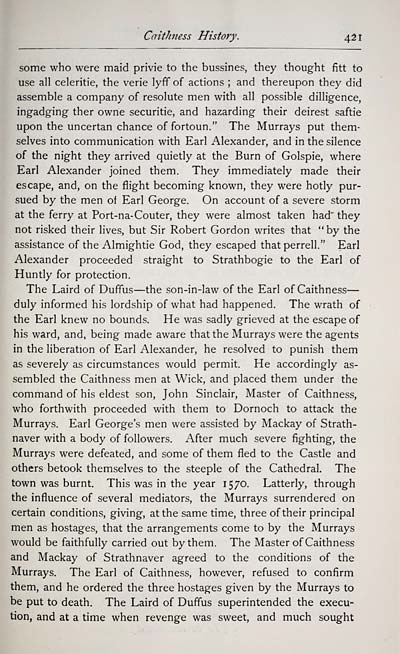Blair Collection > Celtic magazine > Volume 12
(431)
Download files
Complete book:
Individual page:
Thumbnail gallery: Grid view | List view

Caithness History. 421
some who were maid privie to the bussines, they thought fitt to
use all celeritie, the verie lyff of actions ; and thereupon they did
assemble a company of resolute men with all possible dilligence,
ingadging ther owne securitie, and hazarding their deirest saftie
upon the uncertan chance of fortoun." The Murrays put them-
selves into communication with Earl Alexander, and in the silence
of the night they arrived quietly at the Burn of Golspie, where
Earl Alexander joined them. They immediately made their
escape, and, on the flight becoming known, they were hotly pur-
sued by the men of Earl George. On account of a severe storm
at the ferry at Port-na-Couter, they were almost taken had" they
not risked their lives, but Sir Robert Gordon writes that "by the
assistance of the Almightie God, they escaped thatperrell." Earl
Alexander proceeded straight to Strathbogie to the Earl of
Huntly for protection.
The Laird of Duffus — the son-in-law of the Earl of Caithness —
duly informed his lordship of what had happened. The wrath of
the Earl knew no bounds. He was sadly grieved at the escape of
his ward, and, being made aware that the Murrays were the agents
in the liberation of Earl Alexander, he resolved to punish them
as severely as circumstances would permit. He accordingly as-
sembled the Caithness men at Wick, and placed them under the
command of his eldest son, John Sinclair, Master of Caithness,
who forthwith proceeded with them to Dornoch to attack the
Murrays. Earl George's men were assisted by Mackay of Strath-
naver with a body of followers. After much severe fighting, the
Murrays were defeated, and some of them fled to the Castle and
others betook themselves to the steeple of the Cathedral. The
town was burnt. This was in the year 1570. Latterly, through
the influence of several mediators, the Murrays surrendered on
certain conditions, giving, at the same time, three of their principal
men as hostages, that the arrangements come to by the Murrays
would be faithfully carried out by them. The Master of Caithness
and Mackay of Strathnaver agreed to the conditions of the
Murrays. The Earl of Caithness, however, refused to confirm
them, and he ordered the three hostages given by the Murrays to
be put to death. The Laird of Duffus superintended the execu-
tion, and at a time when revenge was sweet, and much sought
some who were maid privie to the bussines, they thought fitt to
use all celeritie, the verie lyff of actions ; and thereupon they did
assemble a company of resolute men with all possible dilligence,
ingadging ther owne securitie, and hazarding their deirest saftie
upon the uncertan chance of fortoun." The Murrays put them-
selves into communication with Earl Alexander, and in the silence
of the night they arrived quietly at the Burn of Golspie, where
Earl Alexander joined them. They immediately made their
escape, and, on the flight becoming known, they were hotly pur-
sued by the men of Earl George. On account of a severe storm
at the ferry at Port-na-Couter, they were almost taken had" they
not risked their lives, but Sir Robert Gordon writes that "by the
assistance of the Almightie God, they escaped thatperrell." Earl
Alexander proceeded straight to Strathbogie to the Earl of
Huntly for protection.
The Laird of Duffus — the son-in-law of the Earl of Caithness —
duly informed his lordship of what had happened. The wrath of
the Earl knew no bounds. He was sadly grieved at the escape of
his ward, and, being made aware that the Murrays were the agents
in the liberation of Earl Alexander, he resolved to punish them
as severely as circumstances would permit. He accordingly as-
sembled the Caithness men at Wick, and placed them under the
command of his eldest son, John Sinclair, Master of Caithness,
who forthwith proceeded with them to Dornoch to attack the
Murrays. Earl George's men were assisted by Mackay of Strath-
naver with a body of followers. After much severe fighting, the
Murrays were defeated, and some of them fled to the Castle and
others betook themselves to the steeple of the Cathedral. The
town was burnt. This was in the year 1570. Latterly, through
the influence of several mediators, the Murrays surrendered on
certain conditions, giving, at the same time, three of their principal
men as hostages, that the arrangements come to by the Murrays
would be faithfully carried out by them. The Master of Caithness
and Mackay of Strathnaver agreed to the conditions of the
Murrays. The Earl of Caithness, however, refused to confirm
them, and he ordered the three hostages given by the Murrays to
be put to death. The Laird of Duffus superintended the execu-
tion, and at a time when revenge was sweet, and much sought
Set display mode to: Large image | Transcription
Images and transcriptions on this page, including medium image downloads, may be used under the Creative Commons Attribution 4.0 International Licence unless otherwise stated. ![]()
| Early Gaelic Book Collections > Blair Collection > Celtic magazine > Volume 12 > (431) |
|---|
| Permanent URL | https://digital.nls.uk/76465771 |
|---|
| Description | Volume XII, 1887. |
|---|---|
| Shelfmark | Blair.13 |
| Attribution and copyright: |
|
| Description | A selection of books from a collection of more than 500 titles, mostly on religious and literary topics. Also includes some material dealing with other Celtic languages and societies. Collection created towards the end of the 19th century by Lady Evelyn Stewart Murray. |
|---|
| Description | Selected items from five 'Special and Named Printed Collections'. Includes books in Gaelic and other Celtic languages, works about the Gaels, their languages, literature, culture and history. |
|---|

